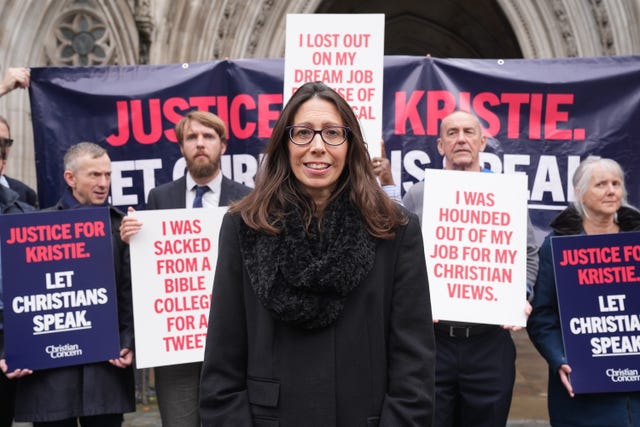Dismissing employees over religious beliefs is unlawful, Court of Appeal rules
The Court of Appeal ruling came in the case of Kristie Higgs, a Christian school worker who was sacked for sharing posts criticising LGBT+ teaching.

Employers cannot dismiss staff who express religious beliefs with which it or a third party disagrees as it would constitute “unlawful direct discrimination”, the Court of Appeal has ruled.
Kristie Higgs, a Christian mother of two, was sacked from her role at Farmor’s School in Fairford, Gloucestershire, in 2019 for sharing Facebook posts criticising teaching about LGBT+ relationships in schools.
On Wednesday, the Court of Appeal ruled in her favour in the latest stage of her years-long legal battle related to her dismissal, describing the decision to sack Mrs Higgs for gross misconduct as “unlawfully discriminatory” and “unquestionably a disproportionate response”.
In a judgment, Lord Justice Underhill, sitting with Lord Justice Bean and Lady Justice Falk, said: “The dismissal of an employee merely because they have expressed a religious or other protected belief to which the employer, or a third party with whom it wishes to protect its reputation, objects will constitute unlawful direct discrimination within the meaning of the Equality Act.”
He continued: “The school sought to justify her dismissal on the basis that the posts in question were intemperately expressed and included insulting references to the promoters of gender fluidity and ‘the LGBT crowd’ which were liable to damage the school’s reputation in the community: the posts had been reported by one parent and might be seen by others.
“However, neither the language of the posts nor the risk of reputational damage were capable of justifying the claimant’s dismissal in circumstances where she had not said anything of the kind at work or displayed any discriminatory attitudes in her treatment of pupils.”
Mrs Higgs shared two posts on a private page under her maiden name in October 2018 to about 100 friends, which raised concerns about relationship education at her son’s Church of England primary school.
She either copied and pasted from another source or reposted the content, adding her own reference on one post to “brainwashing our children”.
Pupils were to learn about the No Outsiders In Our School programme, a series of books that teaches the Equality Act in primary schools.
After an anonymous complaint about Mrs Higgs’ posts, which Lord Justice Underhill said was from a parent of a child at Farmor’s School, she was suspended and then dismissed from her role as a pastoral administrator and work experience manager.
An employment tribunal found in 2020 that while Mrs Higgs’ religion was a protected characteristic, her dismissal was lawful, but this decision was overturned by an Employment Appeal Tribunal (EAT) in 2023.
But the EAT ruled the case should be sent back to an employment tribunal for a fresh decision, which Mrs Higgs’ lawyers challenged in the Court of Appeal as “unnecessary”.
Richard O’Dair, for Mrs Higgs, told a hearing in October in written submissions that protecting the school’s reputation and the rights of others provided “no justification” for her “extremely severe” dismissal.
He continued that there were “extremely speculative and nebulous concerns” about how people might misinterpret her posts and perceive the school.
Sean Jones KC, for the school, told the court in written submissions that remitting the case was “the appropriate course” as “fuller reasons” for the decision were needed.
He continued: “(Mrs Higgs) was not dismissed for manifesting (her beliefs) but because the manner in which it was manifested could reasonably have caused and did cause others to think she was expressing homophobic or transphobic views.”
But in a 57-page ruling allowing Mrs Higgs’ appeal against the EAT’s remittal decision, Lord Justice Underhill said Mrs Higgs’ posts were “not grossly offensive” and instead contained a “series of derogatory sneers”.
He said: “Any reputational damage would only take the form of the fear expressed by the complainant, namely that the claimant might express at work the homophobic and transphobic attitudes arguably implicit in the language used.

“I accept that if that belief became widespread it could harm the school’s reputation in the community.
“But the risk of widespread circulation was speculative at best.”
He continued: “I do not believe that dismissal was even arguably a proportionate sanction for the claimant’s conduct.
“It was no doubt unwise of her to repost material expressed in, to use the employment tribunal’s words, florid and provocative language with which she did not agree, and in circumstances where people were liable to realise her connection with the school.
“But I cannot accept that that can justify her dismissal, and still less so where she was a long-serving employee against whose actual work there was no complaint of any kind.”
Following the ruling, Mrs Higgs, surrounded by several supporters outside the Royal Courts of Justice, said: “Today’s judgment is as important for free speech as it is for freedom of religion.
“Employers will no longer be able to rely on their theoretical fears of reputational damage or subjective concerns about causing offence to discipline employees for exercising their fundamental freedom to express their deeply held beliefs.
“The Court of Appeal has now set a clear standard to protect people like me, and the countless other Christians in this nation, to express their beliefs without fear of losing their jobs.”





